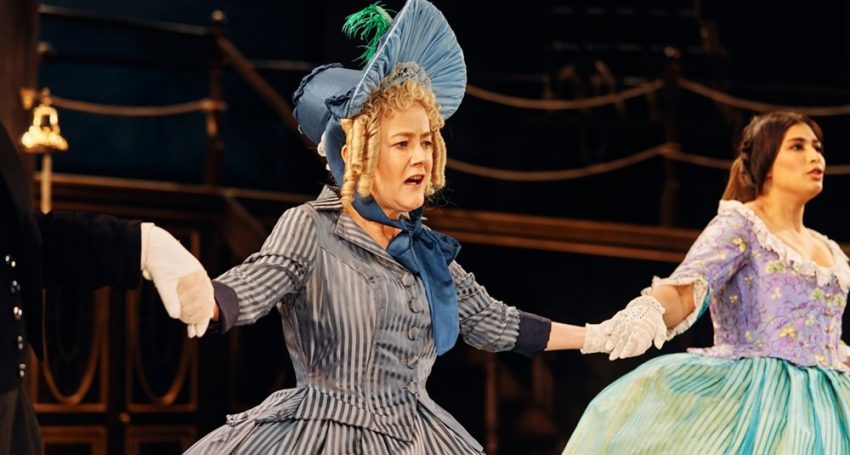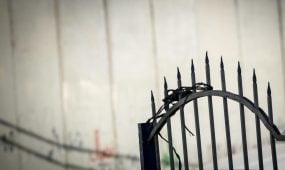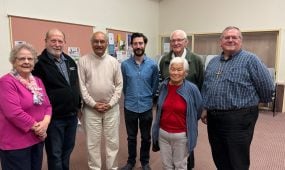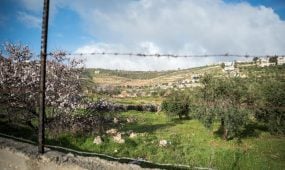How I found my voice – with the help of a beanbag frog
News
“But, on the stage of the Coliseum, dressed for the set of Gilbert and Sullivan’s HMS Pinafore in corset and massive hoop skirt, with ringlets and ridiculous blue bonnet on my head, I really did fill the theatre with my voice. I am so thankful that I saw that article in The Guardian, and that I exchanged the claustrophobic confines of my comfort zone for an expansive space of freedom and joy,” says The Rev’d Dr Ellen Clark-King

“ENO calls on world’s worst warblers to prove anyone can sing”: this was a headline in The Guardian in June 2021.
The piece explained that Sky Arts was working with the English National Opera on a project to show that anyone could sing. Six tuneless members of the public would be coached for 12 weeks by bona fide opera singers to prove the point.
Like many others, I had been told as a child that I could not and should not sing: “Go sit with the crows, not the larks.” At school, I spent music lessons mouthing along to the words, terrified that the teacher would call on me to sing alone. At theological college, our music teacher listened to me and said: “I’ll put you down as a non-singer, then.”
This — unfortunately — did not get me out of having to sing evensong in my placement parish, a painfully embarrassing occasion for me and equally painful for the congregation. I didn’t hit one right note, and could see the looks of pity, as well as the hidden winces, that accompanied every versicle.
After the evensong débâcle, I resolved never to put myself or a congregation through that again. It seemed to be the antithesis of worship: the congregation were unable to relax into the service, and I was unable to hold the space for them as I should. Singing so badly did not help others to focus on God, but kept them miserably uncomfortable and earthbound.
As so often happens, a fear and inadequacy that lead to avoidance result only in greater fear. When I began my new job as Dean of King’s College London, in December 2020, I had no plans to address my singing phobia. So, why, just six months later, did I send in an application (including a short video of my mangling of “O Canada”, for which I should apologise to all fellow Canadians) to be one of the non-singers on Anyone Can Sing?
Advertisement
I was at a point in my life when I felt comfortable in my own skin. I have a well-hidden panic disorder, of which I had been deeply ashamed as a younger woman and, especially, as a younger priest. There had been many Sundays when I presided or preached and would be literally shaking, convinced that this was the occasion when I would faint or flee in the midst of a service.
Having done some hard internal work, however, I felt that this no longer had the grip on me that it had once had. I greatly wanted to be able to sing. This seemed the time to jump right out of my comfort zone, when the cameras could give an external commitment that would hold me to my resolve.
It also seemed fitting to me, as a university dean, to show that lifelong learning is a real possibility. Just as ENO wanted the series to show that opera is accessible to all, I wanted to show that the Church of England is accessible to all, as open to everyone as the God we worship.
I hoped that revealing my vulnerability might encourage other people to acknowledge and address theirs. Often, leadership is assumed to be for people who have their lives sorted, their thick skins in place, and their weaknesses overcome.
Advertisement
My hope was (and is) to be the sort of leader who allows their limitations to be seen as well as their strengths, and who accepts failure in themselves and others as a necessary and valuable part of the journey.
The experience of being part of the show was both hard and wonderful. After the first day, when they whittled ten finalists down to six, we were all set to work. We had one singing lesson a week with the mentor we had been assigned — the wonderful renowned tenor Nicky Spence for me — as well as a weekly lesson with Murray Hipkin, our kind, patient, and talented musical director.
There were challenges along the way to show audiences how we were doing and a finale when we sang arias from La Traviata and The Merry Widow on the stage at the Coliseum, the ENO’s theatre.
The first challenge was to have the six of us as a group, but with solo lines, singing part of “Vissi d’arte” from Tosca at the Crystal Palace Bowl. This was in front of the cameras, but not in front of an audience. I bombed completely.
Appropriately for a priest, my line was “I always pray sincerely”, but of the six of us I was the only one who was completely out of tune. I spent the rest of the day fighting back tears and cried on my husband’s shoulder that night. It took all the courage that I had to return for the next day’s filming.
I wondered at the time, and afterwards, why I reacted so strongly. As Nicky kept reminding me, the stakes were low: no one was going to die if I sang the wrong notes, and part of my reason for doing this whole thing was to show that it was OK to fail. But my emotional and rational responses were way far apart.
My head could say that it was all OK, but still I was heartsick at doing something so badly in public. The shame response is so deeply embedded, and so destructive, that it is crucial to challenge it theologically and in every other way we can. Learning to look on ourselves, as well as each other, with the deeply loving gaze of God is a vital part of moving away from shame to acceptance and hope.
One of the wonderful parts of the experience was sharing the journey with the other participants. The whole series was set up as “anti X Factor”, with no competitive element and no elimination (other than the first episode, which didn’t really fit this ethos). This is vitally important in a culture that is causing mental ill-being and anxiety in its younger members, who are increasingly made to feel that everything in life is a competition and failure is catastrophic.
Khadijah, Shirley, Chris, Rico, Luke, and I were able to cheer one another on wholeheartedly and share the wobbles and anxieties that we experienced along the way, with no fight for approval and recognition. They were people I would never have met otherwise, and people I deeply value having in my life.
This meant that when we came to be back-up singers for the soprano Katherine Jenkins at the Tottenham Hotspur Stadium, we were truly able to support one another. We were singing the alto, tenor, and bass parts of “God Save the Queen” while our soprano star belted out the melody.
We shared with each other the surreal blend of complete fright and massive buzz which came from singing in front of approximately 65,000 fans of American football (many of whom joined in).
By this point, I was also finally learning how to match pitch, by repeated practice and by finding ways of getting out of my head — which included Nicky’s novel teaching technique of throwing a beanbag frog at me whenever I was about to sing.
And then, in October 2021, I sang evensong for the first time since theological college. The college choir and music director could not have been more supportive as I nervously rehearsed the Rose responses.
When it came to the service itself, I found myself surprised by calm, accepting that I could fail again — and very publicly — but that I was open to that as a step in a continuing journey. I didn’t need to be perfect: I just needed to offer to God the best that I could and trust that it would no longer offend the ears, and impede the worship of, the congregation. So, I opened my lips and sang.
That was the real turning point for me. It was a revelation to worship through my singing as well as hold the space for the congregation to worship. Nicky said afterwards: “I couldn’t believe it was you making that sound”; and I really couldn’t believe it, either.
More than that, I knew that this would be just the first time of many. I have since sung evensong several times, never perfectly, but always well enough, and always with deep gratitude that this source of joy has been opened up for me.
I began the series thinking that I might be the one participant who proved its central premise wrong — that, no, not anyone can sing. But, on the stage of the Coliseum, dressed for the set of Gilbert and Sullivan’s HMS Pinafore in corset and massive hoop skirt, with ringlets and ridiculous blue bonnet on my head, I really did fill the theatre with my voice.
I am so thankful that I saw that article in The Guardian, and that I exchanged the claustrophobic confines of my comfort zone for an expansive space of freedom and joy.
Anyone Can Sing is available on Sky Arts.
First published in Church Times on 13 May 2022. Visit the Church Times website to subscribe today.





